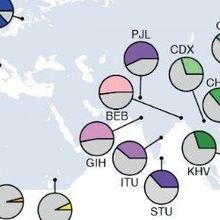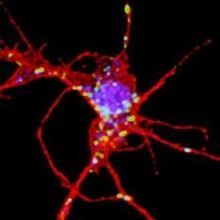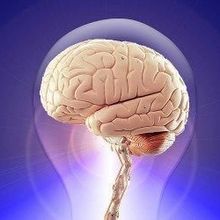Login
Subscribegenetics & genomics, neuroscience

Aging-Related Diseases May Be a Negative Outcome of Human Evolution
Sukanya Charuchandra | May 31, 2018 | 3 min read
Genetic adaptations for human brain development also make us vulnerable to Alzheimer’s disease, according to a new study.

Patent On Autism Genetic Test May Stifle Science
Jessica Wright | May 30, 2018 | 3 min read
LabCorp might be able to charge a licensing fee to any scientists who wish to sequence the gene HOMER1 in people who may have autism.

“Minibrains” May Soon Include Neanderthal DNA
Ashley Yeager | May 14, 2018 | 1 min read
Brain organoids engineered to carry the genetic material could reveal how our brains are similar to and different from those of our closest relatives.

Genetic Adaptation to Cold Brought Migraines With It
Viviane Callier | May 3, 2018 | 3 min read
Humans living in higher latitudes tend to have a variant of a gene involved in sensing cold temperatures, but it comes with a cost.

Researchers Identify Gene Variants Linked to Synesthesia
Catherine Offord | Mar 5, 2018 | 2 min read
A whole-genome analysis of people who experience color when they listen to sounds points to a handful of genes involved in neural development.

Gene Expression Overlaps Among Psychiatric Disorders
Ashley P. Taylor | Feb 8, 2018 | 3 min read
Transcriptional profiling of post-mortem human brains reveals commonalities in the genes over- and under-expressed in schizophrenia, bipolar disorder, autism, and major depression.

“Retired” Mice Find New Life as Top Models for Autism
Jessica Wright | Jan 28, 2018 | 4 min read
After years of obscurity, strains of mice with mutations in particular genes are thrust to the fore of autism research.

Learning Opens the Genome
Ruth Williams | Jan 17, 2018 | 3 min read
Researchers map learning-induced chromatin alterations in mouse brain cells, and find that many affect autism-associated genes.

Primary Cilia in Neurons Linked to Obesity
Abby Olena, PhD | Jan 8, 2018 | 3 min read
Three studies—one of mice and two of human genetics—describe the role of two proteins, adenylyl cyclase and melanocortin 4 receptor, in the development of obesity and diabetes.

Photos of the Year
Katarina Zimmer | Dec 24, 2017 | 2 min read
From a plastic-munching coral to see-through frogs, here are The Scientist’s favorite images from 2017.

Thousands of Mutations Accumulate in the Human Brain Over a Lifetime
Ruth Williams | Dec 7, 2017 | 4 min read
Single-cell genome analyses reveal the amount of mutations a human brain cell will collect from its fetal beginnings until death.

Lessons in Memory from a Champ
Jef Akst | Nov 1, 2017 | 5 min read
A four-time winner of the USA Memory Championship is helping scientists understand how the brain works.

Contributors
Jef Akst and Bob Grant | Nov 1, 2017 | 3 min read
Meet some of the people featured in the November 2017 issue of The Scientist.

Opinion: How to Define Cell Type
Fred H. Gage, Sara B. Linker, and Tracy A. Bedrosian | Nov 1, 2017 | 4 min read
Advances in single-cell technologies have revealed vast differences between cells once thought to be in the same category, calling into question how we define cell type in the first place.

Advancing Techniques Reveal the Brain’s Impressive Diversity
Sara B. Linker, Fred H. Gage, and Tracy A. Bedrosian | Nov 1, 2017 | 10+ min read
No two neurons are alike. What does that mean for brain function?

Infographic: Understanding Our Diverse Brain
Fred H. Gage, Tracy A. Bedrosian, and Sara B. Linker | Oct 31, 2017 | 2 min read
Recent advances in single-cell omics and other techniques are revealing variation at genomic, epigenomic, transcriptomic, and posttranscriptomic levels.

A Single Mutation in Zika Led to Devastating Effects
Anna Azvolinsky | Sep 28, 2017 | 4 min read
One amino acid change within a viral structural protein makes the difference between mild cases of brain damage and severe microcephaly in mice.

Image of the Day: Everybody Needs a Friend
The Scientist | Aug 10, 2017 | 1 min read
The protein encoded by the gene that causes Fragile X in humans partners with another protein, dNab2, to alter gene expression in fruit fly neurons.

Genes Tied to Wasps Recognizing Faces
Ashley P. Taylor | Jun 14, 2017 | 4 min read
The brains of Polistes paper wasps express different genes when identifying faces than when distinguishing between simple patterns, a study finds.

Smarty Genes
Ashley P. Taylor | May 23, 2017 | 2 min read
Scientists have identified 40 new genes linked to human intelligence.